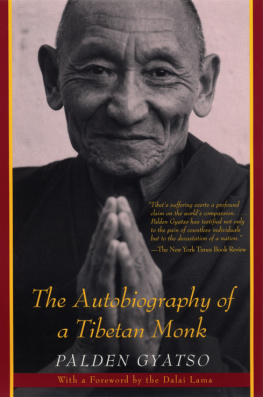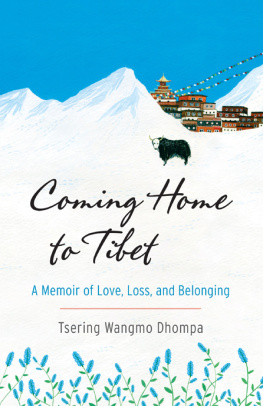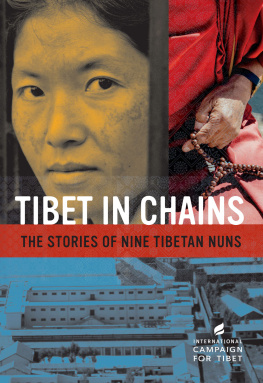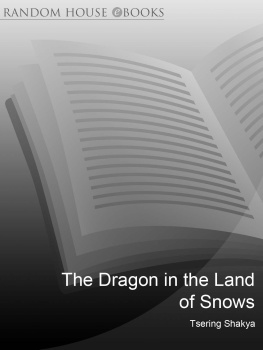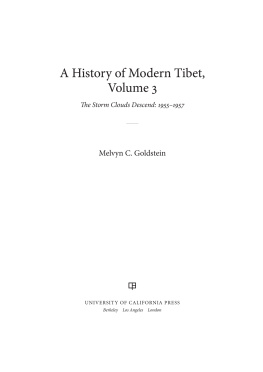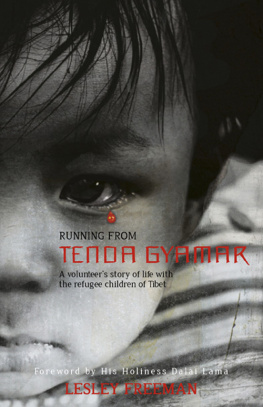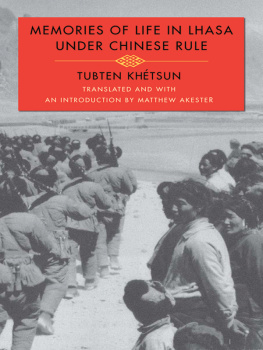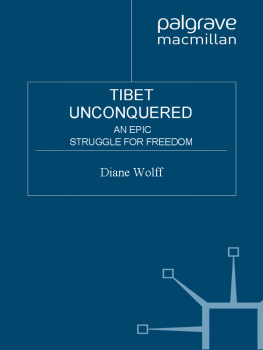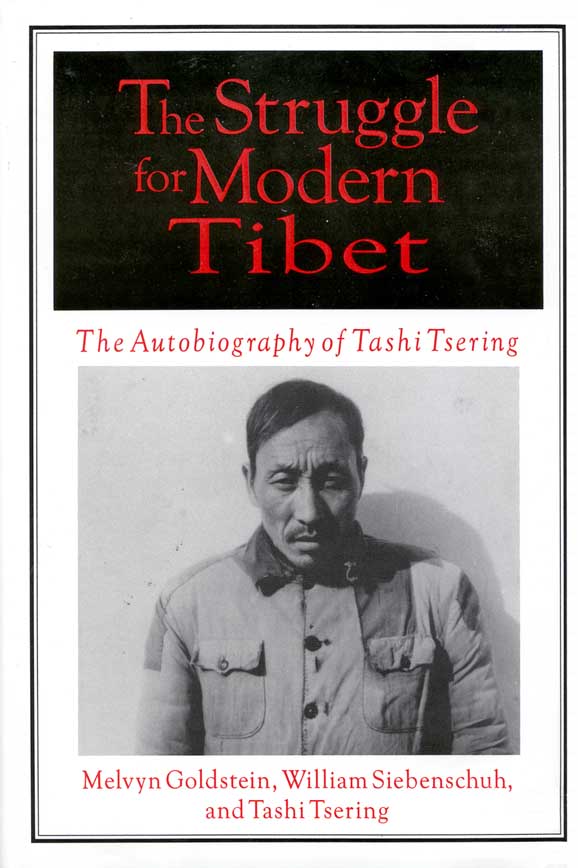|
| The Struggle for Modern Tibet |
| The Autobiography of Tashi Tsering |
Melvyn Goldstein, William Siebenschuh,
and Tashi Tsering |

An East Gate Book |
M.E. Sharpe
Armonk, New York
London, England |
|
| title | : | The Struggle for Modern Tibet : The Autobiography of Tashi Tsering |
| author | : | Goldstein, Melvyn C.; Siebenschuh, William R.; Tashi Tsering. |
| publisher | : | ME Sharpe, Inc. |
| isbn10 | asin | : | 1563249502 |
| print isbn13 | : | 9781563249501 |
| ebook isbn13 | : | 9780585001685 |
| language | : | English |
| subject | Tashi Tsering, EducatorsChinaTibetBiography, Political prisonersChinaBiography. |
| publication date | : | 1997 |
| lcc | : | LA2383.C52T37 1997eb |
| ddc | : | 365/.45/092 |
| subject | : | Tashi Tsering, EducatorsChinaTibetBiography, Political prisonersChinaBiography. |
An East Gate Book
Copyright 1997 by M. E. Sharpe, Inc.
All rights reserved. No part of this book may be reproduced in any form without written permission from the publisher, M. E. Sharpe, Inc., 80 Business Park Drive, Armonk, New York 10504.
Those wishing to make donations to Tashis school project can do so via the
Boulder-Lhasa Sister City Project
776 Cottage Lane
Boulder, Colorado 80304
(303 443-9863)
Photographs courtesy of Tashi Tsering
Library of Congress Cataloging-in-Publication Data
Goldstein, Melvyn C.
The struggle for modern Tibet : the autobiography of Tashi Tsering / Melvyn C. Goldstein, William R. Siebenschuh, and Tashi Tsering.
p. cm.
Includes index.
ISBN 1-56324-950-2 (alk. paper)
1. Tashi Tsering.
2. EducatorsChinaTibetBiography.
3. Political prisonersChinaBiography.
I. Siebenschuh, William R. II. Tashi Tsering.
III. Title.
LA2383.C52T371997
365.45092dc21
[B]
97-4968
CIP
Printed in the United States of America
The paper used in this publication meets the minimum requirements of the American National Standard for Information Sciences Permanence of Paper for Printed Library Materials, ANSI Z 39.48-1984.
BM(c) 10 9 8 7 6 5 4 3 2
The Struggle for Modern Tibet: The Autobiography of Tashi Tsering
Preface
O ne evening in December 1963, Tashi Tsering unexpectedly stopped by my Seattle apartment. I had just finished finals and a busy quarter at the University of Washington and was relaxing playing mah-jongg with three Tibetan friends. As a graduate student in Tibetan language and civilization, I knew Tashi well, so I thought nothing of his uninvited appearance. Stopping by peoples houses was a normal part of Tibetan culture. With the tiles clicking and banging nonstop, we exchanged greetings and commented on exams and our relief at the quarters being finally over. Tashi said he didnt want to join the game and stood by the table watching us and talking. He seemed unusually serious, but then I was paying attention primarily to the flow of tiles, not wanting to miss a discard. After about five minutes Tashi suddenly asked the Tibetans whether they had messages they wanted to send to relatives in Tibet because he was returning home.
In response to a round of Oh, dont fool around and Be serious, Tashi, Tashi didnt elaborate much. He simply repeated that he was returning to Tibet and would convey any messages his friends wanted him to transmit to their relatives. The mah-jongg game continued nonstop, although our comments quickly turned serious with warnings that he was making a big mistake and suggestions that if it were a question of money we were sure help could be found. But Tashi would not relent. He responded unequivocally that his decision had nothing to do with money. Instead he saw himself as a representative of the common people who wanted to help create a new, modern Tibet. The atmosphere became somewhat tense, since the other Tibetans, who were aristocrats, hated the communists and China and were committed to freeing Tibet from Chinese control. No one gave Tashi any messages, and a few moments later he left. In his wake we discussed what we perceived as his bizarre comments together with the nuances of our current mah-jongg hands. The idea that he would actually go back was too unthinkable to take seriously. None of us really believed he would leave America to return to Red China.
I didnt see Tashi again for twenty-two years. Then in 1985, I received permission from China to begin two months of research on a fellowship from the U.S.-China bilateral exchange program (the National Academy of Sciences Committee for Scholarly Communication with the Peoples Republic of China) and arrived in Lhasa in May. I had reestablished contact with Tashi by mail a few years earlier and was overjoyed to find him waiting for me at the guesthouse where my hosts had booked me. After a joyous reunion, he suggested I move to the Snowland Hotel, a small hotel near his home, and I agreed. It was wonderful to see him so well and yet also painful to hear briefly of the terrible times he had experienced. Thus began the second incarnation of our friendship.
Since 1985 I have made numerous research trips to Tibet and have always stayed at the Snowland Hotel so I would be near Tashis house. We visited often. Tashi also remembered that I loved Tibetan food and butter tea, so from the first trip he always saw that I had a good supply of the best quality tsamba (roasted barley flour) on hand and arranged for a flask of fresh, steaming butter tea to be brought to my hotel room every morning for breakfast. He is that kind of person.
On one of my trips, Tashi surprised me by asking if I could help him publish a book about his life. He thought foreigners needed to know about common Tibetansthat is, Tibetans who were not aristocrats or monastic prelates or incarnate lamas. He felt his life story could play a useful role in assisting both Westerners and young Tibetans born in exile to understand the realnon-Shangri-laTibet. I agreed that it was a good idea and told him I would try to help him. As it turned out, soon afterward I was able to invite him to Case Western Reserve University for a few months to assist me on a research project.
Tashi lived with me, quickly settling in on my third floor. One evening not long after his arrival, he again raised the issue of my helping him write a book. As chairman of the anthropology department and director of several research projects, I was very busy at the time but felt I had to agree. Tashi deeply wanted us to work together on his autobiography, and as an old friend I felt obliged (by Tibetan cultural norms) to make the time to help him. However, I insisted that he would have to tell me everything that happened in detailthe good and the bad. As a serious scholar, I told him, I couldnt collaborate on a book that was factually incorrect or self-serving; there were already several Tibetan Pollyanna books, and we didnt need another. Tashi didnt hesitate for a moment. He immediately agreed.
Next page

